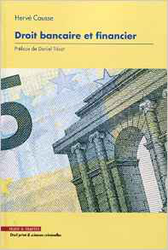
June 16, 2016
Breaking news

Professor Hervé Causse released a book of over 800 pages: Droit bancaire et financier (Banking and Financial Law).
Typically, there are "Banking Law" on one side and "Financial Law" on the other, each giving rise to separate books, Banking Law having long since detached from the Commercial Law and do having never really left Civil Law, Financial Law being more subject recently of books.
Typically, there are the "Banking Law" on one side and the "Financial Law" on the other, each giving rise to separate books, banking, having long since detached from the Commercial Law and do having never really left the Civil Law, financial law being more subject recently of books.
In the books of "Banking Law", we find the contracts, transactions (credit), mechanisms (like money), institutions (such as the National Central Bank) and sometimes specific repressive rules.
In the books of "financial law", first of all, we meet financial market, financial transactions (like all securities transactions or takeovers bids), the economy is much more present, the US Law being at home because of extraterritoriality as either model, repressive rules slipping everywhere, to the heart of what appears to be today a branch of law.
The important work of Hervé Causse goes further and corresponds to reality: it merges the Banking and Financial Law.
He does it because his work is based on the life of the sector, that is to say the professionals. In fact, professionals work in banks. Then he describes those who admit and control their activities, that is to say the authorities of supervision and regulation. He goes on to describe to the reader the instruments, financial prowess that the bankers invent.
Thus sucked by financial reality, what is left of the civil commitment of Banking Law? To take just one example, when the author discusses the concept of "banking service" from that of "financial service", he finds the uncertainty of this notions. The Banking Law is thus trying to forget the Civil Code, the “deposition” techniques being one example.
Thanks to the book of Hervé Causse, the reader understands that the rules now being written by those designing financial regulation, these rules must find their bones in the financial regulatory system.
Updated: June 4, 2012 (Initial publication: June 4, 2012)
Contributions


